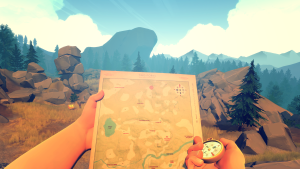 Can you lose yourself in a story? Do you block out distractions, suspend your disbelief and follow the creators down the path they laid out? If yes, then Firewatch’s beautiful oil painting-inspired aesthetic, horror-movie styled music and trail of breadcrumbs will entice you from Day 1till Henry’s final moments.
Can you lose yourself in a story? Do you block out distractions, suspend your disbelief and follow the creators down the path they laid out? If yes, then Firewatch’s beautiful oil painting-inspired aesthetic, horror-movie styled music and trail of breadcrumbs will entice you from Day 1till Henry’s final moments.
Players control Henry, a man running away from his life (metaphorically and literally) as he takes a summer job in the Wyoming wilderness as a fire lookout. As the player, you control Henry’s responses, but ultimately this is his story – you cannot make him into your own image, only guide Henry throughout the summer.
Henry’s character development is built during conversation choices with Delilah a supervisor of sorts who guides the player through on-the-site training and the greater mystery. Delilah seems to be escaping her own life by being out in the middle of nowhere, but seems to have come to terms with her lifestyle choices.
What relationship can these two disenfranchised, damaged characters form over the summer?
Through dialogue trees, Delilah and Henry can become close friends who joke around with each other using sarcastic wit or (supposedly) a more hostile relationship. I only played through once and consistently chose the more friendly or funny responses and did see earlier jokes referenced, conversations evolve and the their relationship grow.
Firewatch is firmly planted in the new genre of “walking simulators.” There are no monsters to fight, mini-games to win or QTE scenes. The story unfolds as Henry moves around the wilderness and interacts with clues and objects. There is no conflict, besides the one you let yourself perceive within the story.
 The videogame mechanics are well hidden within the design and never cause the player to lose emersion in the world. Whenever you need to pull up the mini-map, Henry unfolds an actual map and starts looking where he needs to go next. As you encounter new sites, areas and explore the wilderness, Henry will mark up the map for future reference. This way when Delilah says to head to the lake, it’s up to the player to learn where to go instead of a giant red X pointing the path.
The videogame mechanics are well hidden within the design and never cause the player to lose emersion in the world. Whenever you need to pull up the mini-map, Henry unfolds an actual map and starts looking where he needs to go next. As you encounter new sites, areas and explore the wilderness, Henry will mark up the map for future reference. This way when Delilah says to head to the lake, it’s up to the player to learn where to go instead of a giant red X pointing the path.
In real life, I’m terrible reading a map and this transferred over in Firewatch. There were a couple instances where I would head in the wrong direction or need to double back to find the next clue. I view this as a positive – because your skill in interpreting a map seems to be a one-to-one ratio while navigating Henry on his journey.
Exploration is the game’s reward. If you run from plot point to plot point, you can beat the game in approximately 4 hours, but you’ll miss out on the hidden notes, interactive objects and side conversations with Delilah.
Your mileage may vary, but your enjoyment of the narrative will depend on how much you believe these two characters can grow together while only talking on a radio. Both performances are excellent and will draw the player into the world. The voice actors had their work cut out for them to deliver a convincing range of frustration, fear, wonder and childhood joy – and they passed with flying colors.
Campo Santo placed a lot of small details to keep the player engaged. Henry climbs rocks much slower than the average videogame protagonist and creates a sense of dread, wondering what he’ll see as he hoists himself onto the next ledge. There is an eerie vibe in the world as daylight fades into dusk and the music swells up. A couple times I caught myself looking behind me to see if I could catch the shadowy figure I felt in the corner of my vision.
 Emersion is important to Firewatch. If you only play the game to get to the next point on the map, you are missing the point. This is a stop and smell the roses experience – the journey is as important as the destination (and other clichés regarding travel describe the experience of Firewatch perfectly).
Emersion is important to Firewatch. If you only play the game to get to the next point on the map, you are missing the point. This is a stop and smell the roses experience – the journey is as important as the destination (and other clichés regarding travel describe the experience of Firewatch perfectly).
Firewatch deploys an unconventional approach to trophies and limits the list to 5 trophies for completing 5 different chapters. They easily could have added a few for exploring every section of the map, going form the lake to the mountain in X seconds or any number of random conversations you can unlock with Delilah. I think the focus on a small and story-focused set of trophies was deliberate and matches the tone of the game created.
If you enjoyed Gone Home, Life is Strange or narrative-focused experiences, then Firewatch will be a great addition to your library. If you are looking for more interaction in gameplay and a climatic battle then this isn’t the journey for you.
Level Up, Friends!
